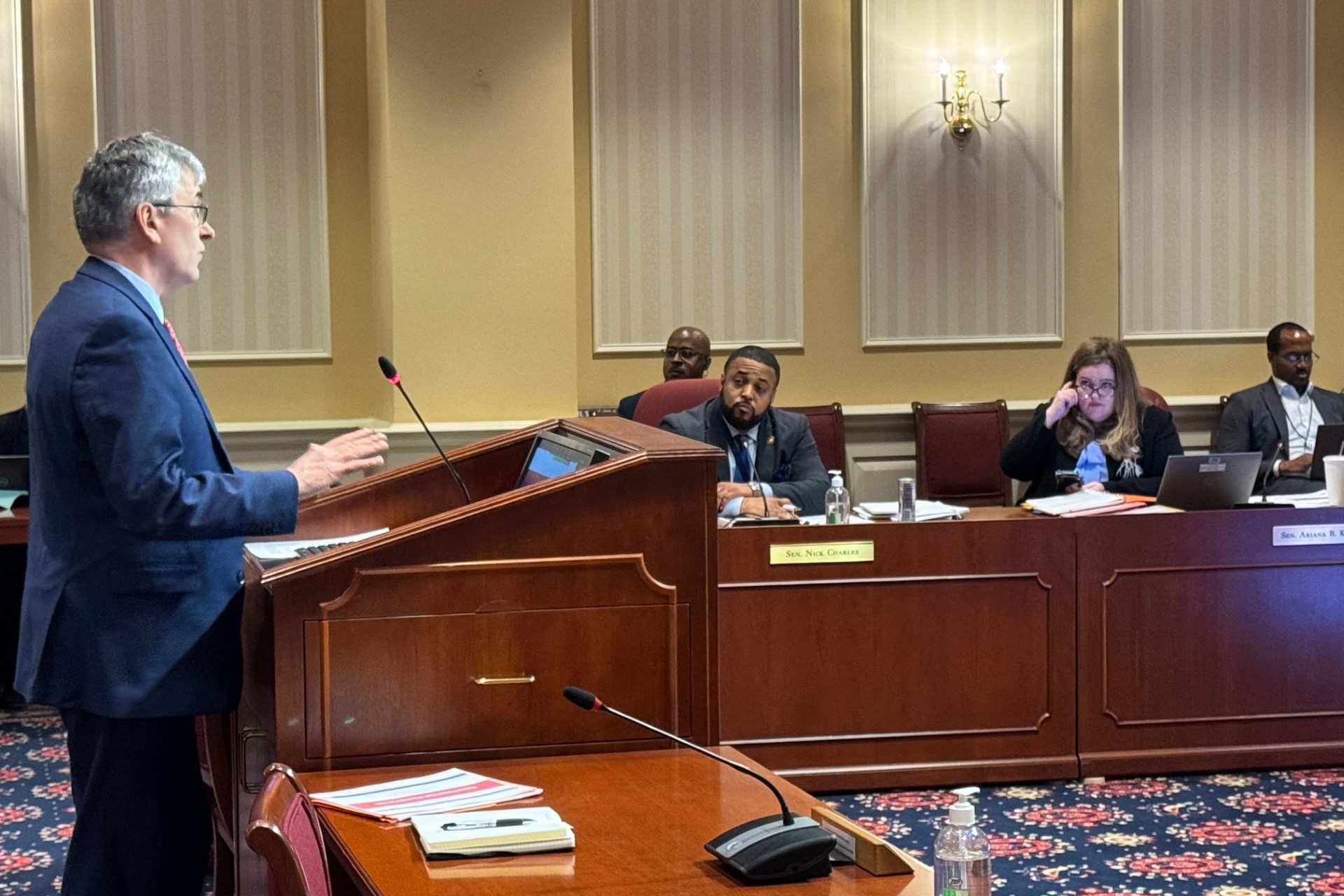
Similar to briefings held in the fall by the Maryland House Judiciary Committee, the Senate Judicial Proceedings Committee conducted its first briefing of the year on the state’s juvenile justice system Tuesday.
Juvenile justice has been a hot topic due to rising levels of violent and non-violent crimes throughout the state and the panel’s discussion spanned more than three hours.
The state Department of Juvenile Services, which monitors and houses some of the state’s troubled youth, has drawn strong criticism from some lawmakers, law enforcement officials and community leaders.
Juvenile Services Secretary Vincent Schiraldi said recent data show complaints to the department are going down.
According to the department, complaints for youth under age 13 decreased from nearly 1,100 in fiscal year 2022 to 301 last fiscal year. Those complaints include crimes of violence, misdemeanors and Children in Need of Supervision referrals.
CINS referrals allow youth to receive a variety of social and other services. While overall complaints for young children have decreased, CINS referrals have gone up; about 26 were filed in fiscal year 2022 and 187 last fiscal year.
Among youth younger than 13, rearrests declined from 34% in fiscal year 2022 to 13% in fiscal year 2023, according to the department.
One reason, Schiraldi said, is the agency began conducting a “Lunch and Learn” series last year in all 24 jurisdictions to explain the CINS process to law enforcement officials, social service providers, educators and parents. Those individuals, or anyone else in the community, can file a CINS referral for a troubled youth in need of additional services.
The referrals, which are managed by the Department of Juvenile Services, did increase, but they are not being used in some jurisdictions.
So Schiradli said the Lunch and Learn series will be held again this year and conducted every quarter.
“We just have to say it over and over again,” he said Tuesday. “We’ll keep explaining it to them.”
Sen. Jill P. Carter (D-Baltimore), a member of the Judicial Proceedings Committee, asked what has been the biggest challenge to getting more referral forms filed for children in need of services.
“The biggest obstacle is that people weren’t aware of it,” Schiraldi said.
Sen. William Folden (R-Frederick), a Frederick police officer and member of the committee, said officers do understand the CINS process.
“I just think there is a lack of support from your office,” he told Schiraldi.
‘Behind their backs’
Although juvenile services published a report in September that showed youth arrests declined by 63% between 2013 and 2020, Montgomery County State’s Attorney John McCarthy (D) said other crimes have increased.
In that county, which is the state’s most populous jurisdiction, McCarthy said the number of juvenile gun offenses increased 220% last year from 2022 and carjackings increased by 200%.
Shootings by juveniles rose from 16 in 2019 to 40 last year in Montgomery County, he said. During the same time, auto thefts increased from 44 to 364.
The figures McCarthy cited are from the county’s police department. A major reason for fewer arrests, he said, is fewer police officers.
“We’re down 300 police officers,” he said. “In many of our counties, we are under policed.”
During the briefing, Wicomico County State’s Attorney Jamie Dykes (R) criticized the Child Interrogation Protection Act and said it “prevents questioning of juvenile suspects.”
“Members of this body expect, as you should, [that] law enforcement keep the peace and protect the community,” she said. “It is, however, too much to expect for law enforcement, prosecutors and courts to keep the public safe with their hands tied behind their backs. With the changes implemented in 2022, that is what you’ve asked us to do.”
According to an opinion dated Thursday from Attorney General Anthony Brown (D), the act is constitutional.
The opinion also notes that some state’s attorneys believe the law might infringe upon parents’ constitutional right to decide whether their child can speak with an attorney, police, or both.
“We find no merit to the argument that the Child Interrogation Protection Act violates a constitutional right of children by requiring them to consult with an attorney before police may subject them to custodial interrogation,” Brown wrote. “As for parents, the Supreme Court has recognized a constitutional right to make certain decisions about a child’s education and upbringing. But the Court has never held that parents have a right to decide whether their children should invoke or waive constitutional protections during custodial interrogation.”
Youth are not adults
Unlike the state’s adult criminal justice system, the Department of Juvenile Services’ first goal is rehabilitation.
The department offers therapy programs for youth, as well as tutoring and mentoring, in some cases by formerly incarcerated people.
The Maryland Youth Justice Coalition, which advocates for legislative change in Annapolis, supports those services, but believes more should be offered.
That coalition — which includes the ACLU of Maryland, BRIDGE Maryland Inc. and other local and state organizations — released a report before Tuesday’s briefing entitled, “What’s Best for Kids is Best for Everyone.”
It outlines additional support such as cognitive-behavioral skill-building, employment and work readiness and wraparound services for children with severe trauma.
In addition, the coalition suggested that other state agencies, such as the health and education departments, collaborate with juvenile services to coordinate and provide mental health resources and after-school programs.
The report also urges the legislature to preserve the Child Interrogation Protection and Juvenile Justice Reform acts that passed in 2022. House Speaker Adrienne Jones (D-Baltimore County) has said the legislature does not anticipate rolling back those measures.
The coalition talked about its report during an online press conference Tuesday morning. The main theme: youth are not adults.
“Any legislative system in society that perpetuates an eye-for-an-eye approach to justice will ultimately be blind to what is truly necessary, and that is to do justice, to love mercy and walk humbly with God,” said the Rev. Marlon Tilghman, a member of BRIDGE Maryland Inc., a network of faith-based organizations and religious leaders, “To take a child’s right to have legal counsel to expedite the judicial process says that time is more important than that child’s development and future.”
A pre-filed bill on the General Assembly’s website – Senate Bill 94 – sponsored by Sen. Ron Watson (D-Prince Georges) and co-sponsored Sens. Mary Beth Carozza (R-Lower Shore) and Chris West (R-Baltimore County) — proposes to extend probationary periods from six months to two years. For certain cases, the probation period could be extended up to three years.
For a juvenile found guilty of a felony or a crime involving a firearm, the bill would allow the court to extend probation to a period of up to five years.
Maryland Public Defender Natasha Dartigue, who attended the press conference, disagrees with that proposal and said the focus should be on restorative justice, providing mentors and other age-appropriate resources.
“These are the interventions that are needed and important because children cannot simply be viewed as miniature adults,” she said.
The Senate Judicial Proceedings Committee will hold another briefing Wednesday focused on medical perspectives on gun violence and gun violence prevention, generally, but “with an eye toward juveniles,” according to committee chair William C. Smith Jr. (D-Montgomery).




 Creative Commons Attribution
Creative Commons Attribution